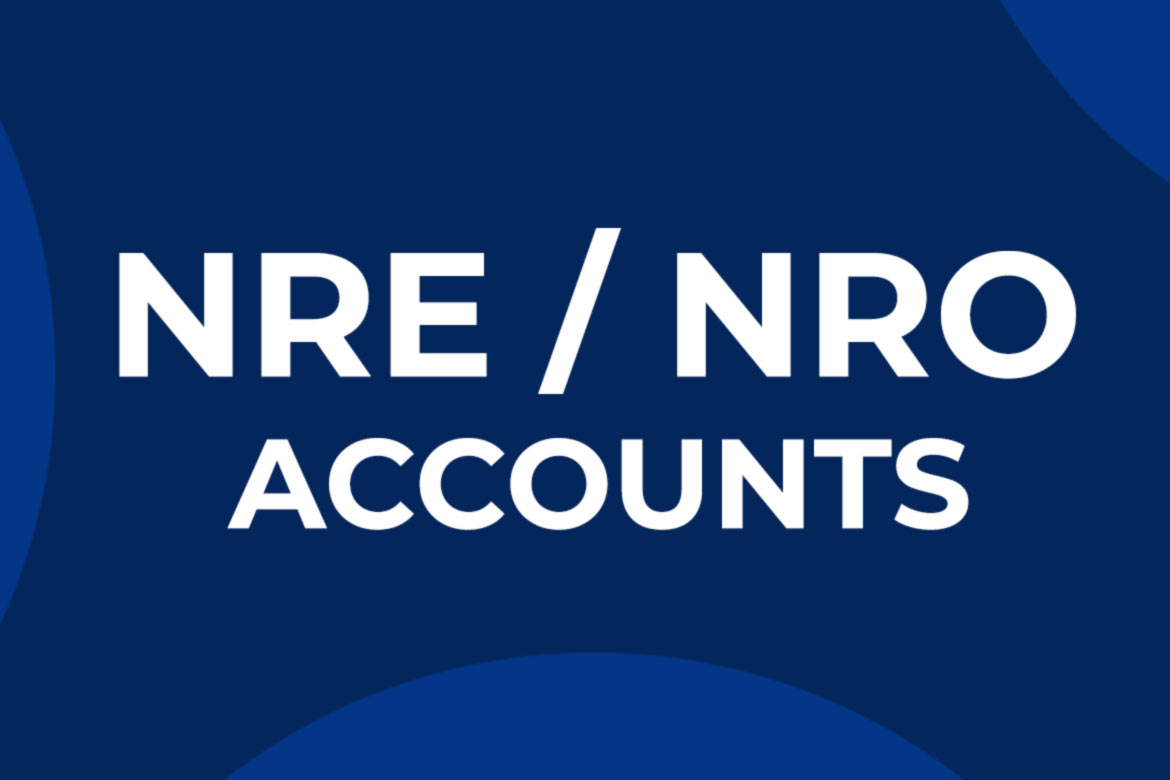NRE and NRO accounts, Globalization has become the new standard in today’s society. Every day, people leave their home nations in search of better possibilities. Indians are renowned for working and residing in several nations. More than 1.3 crore NRIs and people of Indian origin were projected to be residing abroad in 2021. Legally, Indians who make money abroad are unable to conduct financial transactions using a typical savings account. For these transactions, specialized accounts like NRO and NRE have been made available.
NRE Accounts: What Are They?
The NRE account is used to store foreign currency earnings that are denominated in Indian rupees. It is stated to as an account in Indian rupees that provides total security.
NRE accounts are available as current, savings, fixed deposit, and recurring accounts. This account is responsible for converting foreign currency to Indian rupees. A person’s NRE account will instantly convert any foreign currency deposited there into Indian rupees.
Additionally, they can freely transfer the interest or principal balance from an NRE account to a foreign account.
However, it must be made clear that the money transferred into the NRE account was generated outside of India. This account may also be opened in joint names; however, the joint account holder must be NRI.
The capital, as well as the interest amount, are tax-free because the interest earned on the NRE account deposit is tax-exempt.
Any amount deposited in an NRE account may be repatriated at any time by the depositor. International debit cards that let a customer make transactions and withdraw money around the clock are the main advantage of an NRE account.
Additionally, if someone associates their NRE account number with the investment account, the money becomes more accessible. In India, NRE accounts are mostly utilized for personal banking, commercial accounts, and investment purposes.
Read More: How to open a bank account in India for a Minor
NRO Account: What Is It?
In order to handle their income from various sources in India, such as pensions, dividends, rental income, etc., NRIs in India maintain NRO accounts, which are essentially savings or current accounts.
Owners of accounts can easily deposit and administer their accumulated rupee funds. Receiving money in foreign or Indian currency is the main perk of having an NRO account.
One can transfer funds from their present NRE account to an NRO account as well as open an NRO account jointly with an Indian resident or an NRI.
The withdrawal currency is the main distinction between an NRE and an NRO account, though. An NRO does not permit the unrestricted transfer of cash.
In contrast to an NRE account, the interest accrued on deposits in an NRO account is subject to a 30% source-deductible tax rate. After paying the necessary taxes, a person living outside of India may send up to $1 million in a calendar year.
People who receive their income from India should open an NRO account.
Why Do NRIs Invest in India?
The Foreign Exchange Management Act (FEMA) provides regulations that NRIs must abide by while making investments in India with any foreign earned capital. NRIs are permitted by law to invest in securities such as mutual funds, real estate, and stocks. NRIs have two options for getting access to the capital markets: the Direct Subscription Route or the Portfolio Investment Scheme.
The RBI’s Portfolio Investment Scheme is the main investment vehicle for NRIs. Through the program, NRIs can purchase and sell stocks, debentures, and other Indian securities that are permitted by the RBI. Depending on the type of investment, NRIs must decide between using NRO or NRE accounts.
Read More: Information on the price of wedding insurance?
What’s the process for these Accounts?
Similar principles apply to NRE and NRO accounts. Whether an investment is returnable or non-returnable affects the type of account to use. NRIs are required to disclose their investment strategy while making investments in India.
You must choose an NRE account if the payment method is entirely refundable if it isn’t, you can’t use it. Choosing an NRO account is required if the payment method is non-repatriable. If the investment is not tax-exempt, the tax is taken out at the source when the investment is redeemed.
Before investing, choose an NRE account if you plan to transmit the money after redemption outside of India. Transparency must be upheld by NRIs when making investments in India. Only NRIs are eligible to redeem capital deposited from India, thus they must put out their abroad address on the NRI banking form.
What differentiates NRE accounts from NRO accounts?
Taxation
One does not have to pay wealth tax, income tax, or gift tax in India if they have an NRE account, which is tax-free. On the other hand, the interest that has accrued on credit balances and NRO accounts falls under the appropriate tax bracket.
The appropriate gift and wealth tax applies to those who have NRO accounts. However, a person may make use of the Taxation Avoidance Agreement’s lower tax benefit.
Transferability
The funds held in NRE accounts, including the principal amount and any interest generated, are freely transferable.
In contrast, transfers made from an NRO account are limited to $1 million per fiscal year and can be used to post-pay appropriate taxes.
Holding Framework
A person may open an NRE account with a Resident Indian, another NRI, or a close family. On the other hand, anyone who is an Indian resident and an NRI can open an NRO account together.
Currency Deposit and Withdrawal
A person can easily deposit foreign currency and withdraw it in rupees from an NRE account. The NRO account, however, requires that both be in Indian rupees.
Deposit Policies
The NRE account cannot accept deposits of money made in India, but the NRO account cannot accept deposits of income made abroad.
A suitable condition
An NRE account is an option for anyone who wants to keep their foreign earnings in Indian rupees. They are useful for keeping your funds in liquid form as well.
In contrast, a person can use NRO accounts if they desire to save their income from India in rupees. The sale of real estate, dividends, income, rent, and other financial gains are among these profits.
Money Transfer
The ability to move money between NRE and NRO accounts is provided by an NRE account. However, transferring money from one NRO account to another is not possible with an NRO account; it is only possible to move money between NRO accounts.
Changes in Exchange Rate
NRE accounts are susceptible to conversion losses and variations in the value of the local currency relative to a foreign currency. In contrast, there are no conversion concerns with an NRO account.





